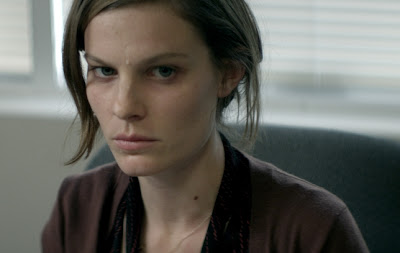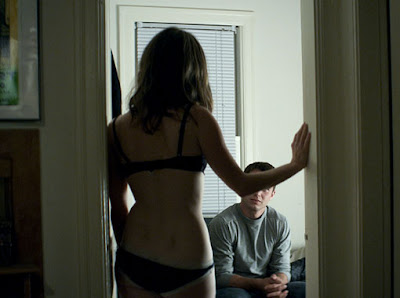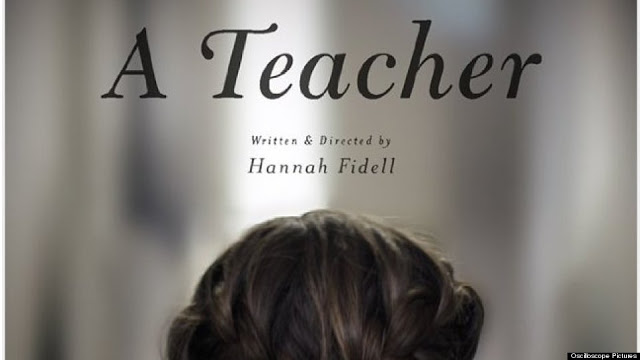Written by Max Thornton.
People sure like to make movies about teacher-student relationships. It’s always incredibly skeevy, of course, to watch someone in a position of authority abuse their power, but cinematic representations are rarely as nakedly awful as the reality.
A Teacher consciously downplays the really appalling aspects of intergenerational classroom romance without ever intimating that it’s anything other than a very bad idea. As suggested by the title, the film focuses entirely on young English teacher Diana Watts (played by Lindsay Burdge), for whom the relationship is at least as destructive as it is for Eric, the pupil (who is, if it makes a difference, a high-school senior and significantly bigger physically than she is).
The total focus on Diana is signaled from the opening classroom scene, where the camera stays fixed on her, regardless of who is speaking. This directorial choice recurs throughout the film, and it serves to highlight her naïve solipsism. It’s tricky to maintain audience empathy for a viewpoint character while also drawing attention to her self-centered immaturity, so props to director Hannah Fidell for finding a deft way to put us inside Diana’s head (hearing other characters’ dialogue from her perspective) while still maintaining an outsider’s gaze (looking at her face).
 |
| Lindsay Burdge as Diana. |
Overall, both style and acting contribute to an odd sense that Diana is not the one doing the victimizing in this circumstance. Factor out her job, and this movie would just be the story of dumb puppy love, a young woman so hopelessly smitten with the very idea of romance that she’s heedless of the realities of the situation. But, of course, her job is the point – the movie’s called A Teacher – and the experience, knowledge, and wisdom implied by that position are dramatically at odds with her incredibly adolescent attitude toward the whole relationship.
Early in the film, while hooking up with Eric in his car, Diana reminisces about similar trysts from her own high-school days. It’s a tellingly sad and uncomfortable little moment that kicks off a spiral of nonstop sadness and discomfort: Watching a grown-ass woman sext and Facebook-stalk a teenage boy is both tragic and kind of disturbing. There’s something Carey Mulligan-esque about Burdge’s face when she’s in bed with Eric, evoking (as does the title) another film in which the questionable sexual relationship is the other way around, age- and power-wise.
Perhaps the echo is deliberate. Diana never seems to have any power in this relationship, never acts like the teacher or the one giving the education. Even in the bedroom, Eric calls the shots (“Take your clothes off.” “Come here.”), and, while driving his car, he describes feeling as though his penis is getting bigger, coming into its own, “powering up.” For him, sex with an attractive young teacher is a power fantasy come true. The lovelorn look of the infatuated is notably absent from his face throughout the film, even as Diana is distracted from grading papers by soft-focus fantasies of him.
 |
| Oh girl. |
Diana doesn’t have to be alone in these delusions of romance. The hand of friendship is consistently extended by her coworker and her roommate – both of whom are women, the latter of whom is even named Sophia– but she ignores this potential salvation in order to continue down the self-destructive path of reliving her high-school sexuality and daydreaming of underage man-meat.
That’s not really an unfair assessment of Eric, who is little more than a cipher. He’s just there to be strong and silent and sexy, a backdrop for Diana’s nostalgic projections, whose actual personality she never seems to take into account. Almost everything he says to her is to do with sex. By contrast, Sophia tells Diana she cares about her. In a heartbreaking pre-Thanksgiving scene, Sophia monologues anxiously about the upcoming holiday with her family, and Diana completely ignores her in order to text topless selfies to her teenage boyfriend.
Ultimately, the film’s lesson is of the value of companionship and empathy, and the danger of total self-absorption. Someone who only chases empty nostalgia for her former self (check her name, Diana, and in case you didn’t get it her brother’s called Hunter), and never bothers with the richness of female friendship that is right there in her life, is not going to end happily. A shallow focus on finding hunkitude in all the wrong places, instead of paying attention to your friends, is not the pathway to a fulfilling life.
Max Thornton blogs at Gay Christian Geek, tumbles as trans substantial, and is slowly learning to twitter at @RainicornMax. He can never format this bio line correctly.


I’ve noticed that in these woman teacher-male students dynamics, the woman comes off like the true victim(I haven’t seen this, but i did see Notes on a Scandal)